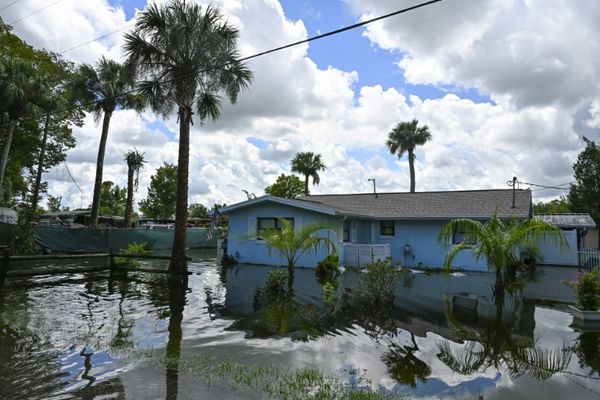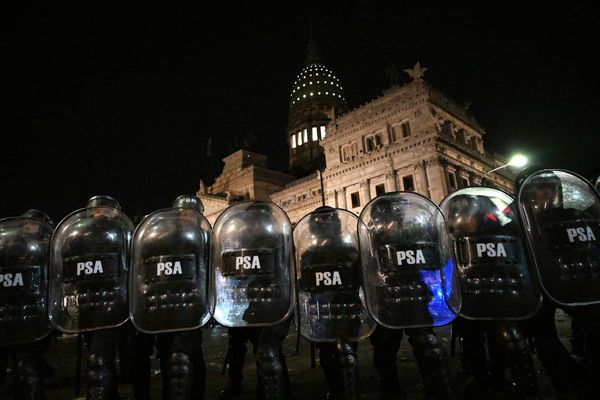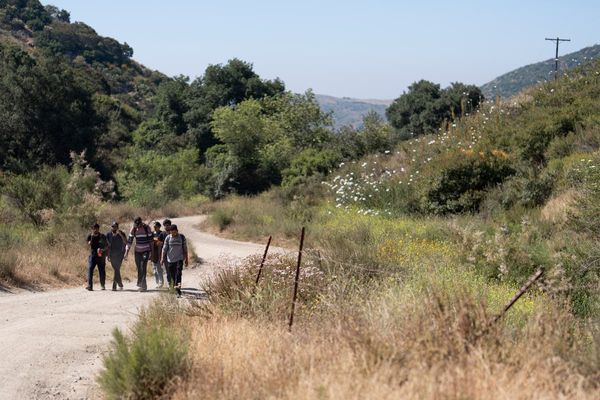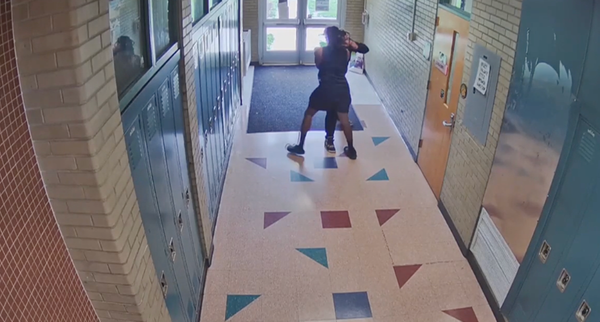Like it or not, the culture wars are on Temecula’s agenda.
While the southwest Riverside County city of 110,000 has long been conservative, the leadership of Temecula’s city council and school board has veered further right in recent months, wading into matters like race, abortion and whether to recognize the LGBTQ community that go beyond the nuts and bolts of local government.
The council no longer declares events such as Black History Month and considered banning abortion, while Temecula Valley Unified School District trustees prohibited the teaching of so-called critical race theory to the district’s 28,000 students.
Past city councils rarely dealt with matters beyond their control, said Jeff Comerchero, who served on Temecula’s council from 1997 to 2018.
“Whenever somebody would mention ‘We should take a stand on something,’ everybody else pushed back because it wasn’t our place to go there,” he said. “Every level of government has their responsibilities and those things simply were not ours.”
But now, the board’s and council’s latest moves have critics fearing what might happen to the city and highly ranked school district they love.
“I see social media posts from people who are looking to move to Temecula and it’s hard to respond,” Christine Massa, a 19-year Temecula resident, said via email. “It’s ugly at the moment.”
In November, three candidates backed by a Christian conservative political action committee won a majority on the school board and a first-time conservative candidate unseated longtime Temecula City Councilmember Maryann Edwards.
In its first meeting, the school board majority — Joseph Komrosky, Danny Gonzalez and Jen Wiersma — banned critical race theory, a term for a college-level course of study that conservatives use to attack K-12 lessons on slavery and U.S. race relations.
Conservative media outlets hailed the move, which earned Komrosky and Wiersma airtime on Fox News. Hundreds of Temecula high school students, outraged with what they saw as the board’s whitewashing of historical truths, walked out of class in December and January.
Gonzalez described his vote on the critical race theory resolution as “intended to be precautionary.”
“The definition of CRT is rarely agreed upon. It was my viewpoint that because the resolution described in such detail, most of the (tenets) of CRT that many find problematic, it would help to clarify what is meant when referring to CRT,” he said in an email.
“While we as a board continue to evaluate this issue, we will address what goes on in the classroom in an honest and open way that ensures teaching real history while being mindful not to perpetuate an adult’s political agenda into the young minds of our students.”
Wiersma also defended her critical race theory vote.
“I am NOT about canceling history, marginalizing students or whitewashing the content of their education,” she said via email. “My proactive stance on CRT pedagogy will help ensure the correct choice for future ethnic studies material and other curricula.”
In January, the council voted 3-2 — Brenden Kalfus, who beat Edwards in November, sided with the majority — to stop issuing citywide proclamations recognizing months like Black History Month that celebrate cultural diversity, women’s history or the LGBTQ community.
Instead, the council left it up to Temecula’s 2-year-old diversity commission to designate such months. It recognized Black History Month on Feb. 9.
In September, the council rejected an anti-abortion resolution that would have declared Temecula a sanctuary city for the unborn.
Months earlier, Councilmember Jessica Alexander, the resolution’s sponsor, blasted a council proclamation honoring LGBTQ Pride Month. Alexander, who has opposed the diversity commission, has said Pride Month goes against her faith and values and that such proclamations create more division and “do nothing to contribute to the running of our city.”
Rallied through social media, school board supporters clad in red — “Saving America starts with (the) school board,” proclaimed one red T-shirt — and critics wearing blue have faced off at recent board meetings. Both sides cheered and applauded comments they liked as sheriff’s deputies kept the peace.
City still red, but not as much
What’s happening in Temecula isn’t unique.
School boards and city councils nationwide have become battlegrounds in a sharply divided political climate in which the other side isn’t just wrong — it’s the enemy.
Schools in congressional districts that voted for Donald Trump, who won Temecula in 2016 and 2020, were most likely to see efforts to limit or challenge instruction on race and LGBTQ rights and ban certain library books, John Rogers, a UCLA professor who co-wrote a study on how political conflicts affect public education, said via email.
Temecula isn’t new to culture clashes.
In 2010, the council approved plans to build a new mosque after a public hearing that ended after 3 a.m. and protests where mosque opponents brought their dogs to antagonize Muslims.
That same year, officials faced cries of censorship after removing a portrait of a nude woman from a city-run theater. In 1995, Residents protested the showing of the NC-17-rated movie “Showgirls” in a Temecula movie theater and, in 2008, criticized a charity performance of the play, “The Vagina Monologues.”
While California is a blue state and Democratic voters outnumber Republicans in Riverside County, Temecula has long been a GOP haven. The city’s Ronald Reagan Sports Park, which features a statue of the former president and conservative icon, became a rallying point for a 60-mile caravan of Trump supporters in 2020.
While there remain more Republicans than Democrats in Temecula, the gap is narrowing. In 2005, 55% of Temecula voters were Republican, compared to 23% for Democrats. In late 2002, 38% were Republican; 31% were Democratic.
The city’s also become more diverse. In 2010, 70% of Temecula residents were White. That fell to 55% by 2020, and Rogers said the percentage of White students in Temecula schools dropped from 72% in 2000 to 42% in 2020.
Events of 2020 motivated left, right
Temecula’s growing diversity — and sensitivity to it — was on display in at least two Black Lives Matter protests in the city in 2020.
At an event by the progressive group Temecula Unity that year, Massa said she “was particularly struck by one story … about a Black family who didn’t feel particularly welcome in (their) own neighborhood — my neighborhood.”
Around the same time, Temecula conservatives may have had their own awakening.
As the pandemic ushered in remote learning, “a lot of parents became aware of some of the things that were being taught in school and things that maybe they found objectionable,” said Rick Reiss, a Temecula conservative and frequent speaker at council meetings. “I think it kind of created an impetus for change.”
Gonzalez said his school board journey started when he wanted to address parents’ concerns during the pandemic’s early days and that led to a group that urged him to run.
Last spring, Inland Empire Family PAC, with the help of conservative Pastor Tim Thompson of 412 Church Temecula Valley, endorsed and bankrolled seven candidates, including Komrosky, Gonzalez and Wiersma, for southwest Riverside County school boards. Five won seats in the Temecula Valley, Murrieta Valley and Lake Elsinore school districts.
Under pressure to provide better opportunities for minority candidates, Temecula’s school board and the council started electing leaders by districts — as opposed to having candidates run in the entire city or school district — in 2016 and 2018, respectively.
That made it easier for groups like the family PAC, said John Hunneman, a retired southwest Riverside County reporter and columnist who lives in Murrieta.
“There are areas (in Temecula) that might be more conservative or areas where you could rally people, whether it’s with a church or with a social group,” he said. “And they don’t need to get that many votes (to win a seat) because they’re only campaigning in a fifth of the city.”
When should council get political?
Until recently, Temecula’s five-member council wasn’t a partisan hotbed.
When he was on the council, Comerchero said: “There were times when I didn’t have any idea what political party one of my colleagues (was registered with), and they didn’t care. None of us did.”
The council’s focus, he said, was on the issues it could control, such as maintaining roads and parks and funding police and firefighters.
James “Stew” Stewart, who was elected to the council in 2016, said the council shouldn’t weigh in on national issues because it’s “a nonpartisan body with no power to change (those issues).” But it’s a matter of free speech if a council member wants to speak from the dais on those matters, he said via email.
Kalfus, a self-described conservative, said via email that whether the council should step into outside politics depends on several factors.
“If the social issue or national political topic pertains particularly to something occurring within our city limits, then it may be appropriate for (the) council to weigh in.”
Alexander did not respond to requests for comment.
City’s direction cheered, feared
Temecula’s residents are divided on what’s happening.
“This isn’t like Republican or Democrat,” Temecula Unity activist Julie Geary said. “This is someone that is trying to tell someone else how to live their life versus the freedom for people to live their life how they want to.”
Jeff Pack, a Temecula resident and co-founder of One Temecula Valley PAC, said he’s worried the council’s and board’s actions “will have long-lasting effects on our city’s reputation, economy and educational opportunities for our kids.”
“Elected officials at the city and school board levels are not elected to be moral, religious or political leaders. They are elected to do the business of the cities and the school districts,” he said via email. “Clearly, some of the recently elected have misunderstood what their roles are.”
Gonzalez said his Christian faith “does not disqualify me from being a school board member and simply being Christian doesn’t mean I would support any sort of a theocratic regime in our school district.”
“It does mean I have faith in God and, like many other people of faith in our community, I consider my faith when making decisions in all aspects of my life,” he said.
Gonzalez said he’s been accused of belonging to far-right groups and called a “white nationalist, racist, bigot, and many other disgusting accusations … I disavow these labels and I will not apologize for having faith in God.”
Gonzalez said he, Komrosky and Wiersma “wholeheartedly reject the notion that supporting a parent’s right to decide when and where adults other than themselves discuss sex and sexuality with their children will lead to marginalizing LGBTQ students.
“In fact, one might say that these critics intend to marginalize the three of us, as well as other students, for our faith.”
Komrosky did not respond to requests for comment.
Asked if she’s worried about Temecula becoming divided, Wiersma said people never agree on everything and “differences in opinion can be constructive and help improve our community and its public education system.”
Geary said she’s been called “a groomer (and) a pedophile” on social media. Despite the backlash, she said she’s not leaving Temecula.
“We’ve had so many kids in (the school district) rise up on their own (and find) their voice (and they’re) making these amazing posts on Instagram … to fight for the change that they believe in,” she said.
“So in this fight, there’s so much beauty … and that’s not gonna change. Once you open the can, you can’t put that back in.”
———







